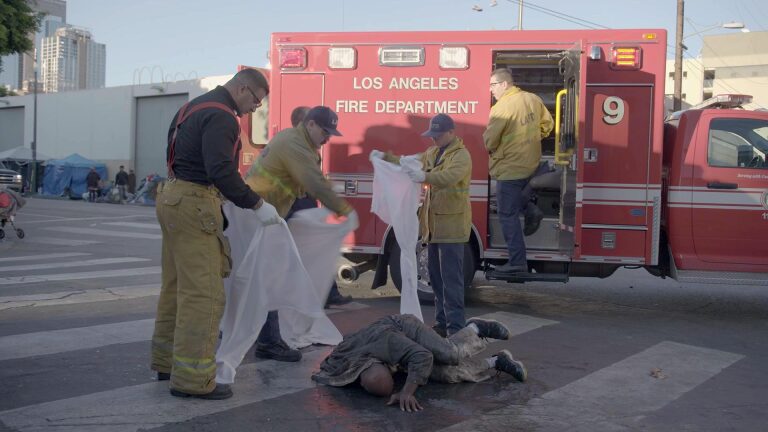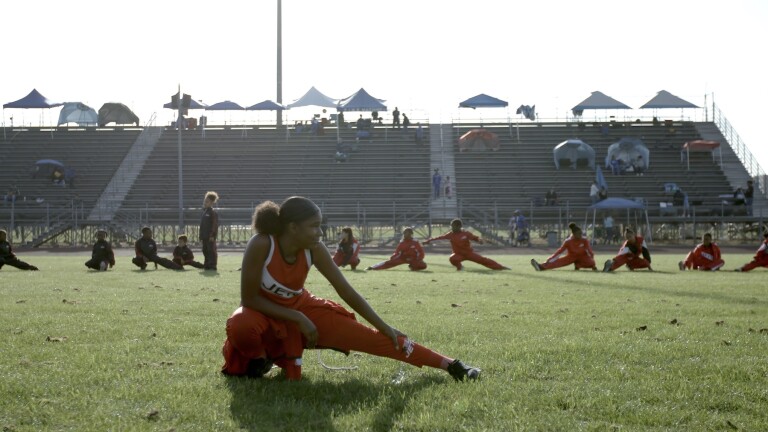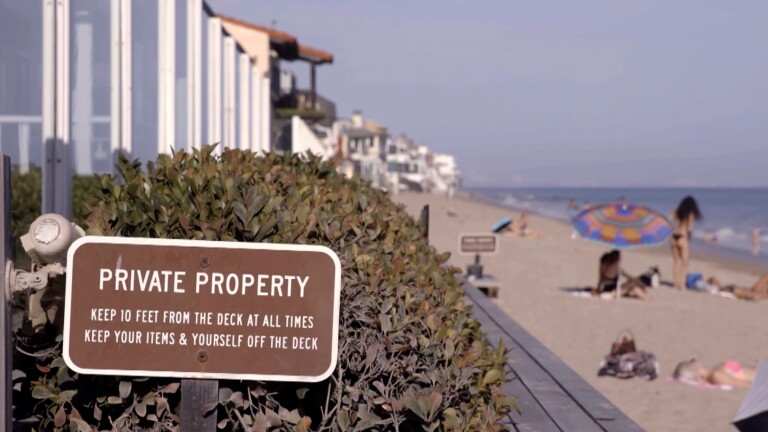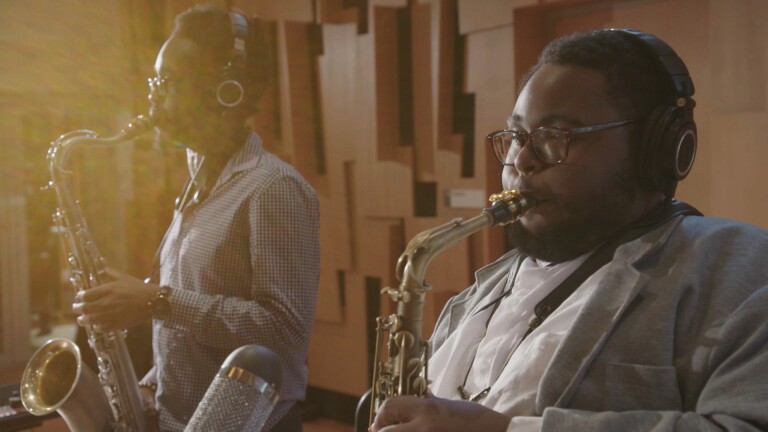
With Prices Sizzling in the Southland, Housing Market Looking Up
Is Southern California's housing market finally headed for recovery? It's been a rough four or five years with home values collapsing and banks foreclosing. Terms like "underwater" and "upside down" are the new language of real estate. Now there are signs that the "bad old days" may be coming to an end. Prices are climbing again, up to 7 percent compared to a year ago. It's good news if you're looking to sell. And if you hope to buy, there's something you should know -- the pros have already jumped in.
Transcript:
Laurel Erickson: This is Robert. He's a Realtor. He drives back roads, boulevards and side streets scoping for deals. And this is Dan. He's a family guy looking for new digs. And these are the flippers, Phil and Deborah. And they are all competing to find homes in L.A. Flags are waving and signs are hanging all over Southern California.
The housing market is sizzling again after taking a few years off during the great recession. It's fueled in part by record-low interest rates and fewer foreclosed properties. Housing prices are up across the Southland, with some counties seeing double-digit increases. Orange County, 5.9 percent. Los Angeles, 9.7 percent. Riverside, 11.3 percent. And San Bernardino, 13.3 percent.
While housing prices in Southern California are not back to their peak in 2007, they are 27.5 percent higher than the y were at the lowest point in 2009.
Here is the picture: California's median house price is $287,000 -- that's up from its bottom price of $221,000 in 2009, at the height of the recession.
Richard Green/USC Lusk Center for Real Estate: Until February, we weren't seeing this. And now we are seeing houses go on the market and they are off the market in a week or two with seven, eight, nine offers, and often above listing price.
Erickson: Green told us the real estate hot spots are Pasadena, the Inland Empire, and anything along the coast. That's where we met Robert Meadows.
Meadows: It's booming. People are having seven to 15 multiple offers on every house that is on the market. Where we used to see 70 houses on the market, you are down to 30 houses in the market.
Erickson: He took us on a tour of West L.A., where inventory is low and prices are up.
Meadows: Over my shoulder, we have a house that was listed for $1.1 million. It sold like that. And then we relisted it for 1.4 [million] and it sold instantly, like that. The first day, we had a hundred people come through the house -- a hundred people! I mean I could not keep the people from coming into the house. I had to "Stop! Stop!" That's how big it was.
Erickson: We drove a few miles and saw another hot property.
Meadows: About three months ago this house was on the market for 649 [thousand] and the minute they put the sign on the grass they had 20 offers. I had a client, and we put in a bid. We didn't even come close to it. Twenty offers overnight. It sold well above the asking price.
Erickson: And just a few blocks over.
Meadows: This house went for 449 [thousand]. We called the agent up, we told her we wanted to put an offer in. She said she had three offers. Twelve hours later, they have 12 offers. We missed out. Gone.
Green: I think the reason this is so surprising is we went through such a long period, where it took a very long time to sell a house. There weren't that many people out there interested.
Erickson: Not anymore. This family, the Garrs, are struggling to find a home in a supply-starved market. For a year, they've been looking to buy. Forty open houses later, they are still looking.
Dan Garr: We put bids down on three homes and once we initiated the bid, it started to go up and get competitive, and going up something in the neighborhood of $100,000. And it's going fast, competitive. You are competing with people with all cash down.
Erickson: People like this woman, Deborah Cavallaro.
Deborah Cavallaro: I am public enemy number one for the typical purchaser, the family guy that wants to buy that property and live in it.
Erickson: That's because Deborah Cavallaro is a "flipper." She buys homes, fixes them up, and quickly puts them back on the market at a higher price. Unlike most family guys, Deborah buys homes with cash.
Cavallaro: So we are a more desirable buyer to the seller, whomever that may be" because we can close faster.
Erickson: She's flipped four homes in the past year, including this one.
Cavallaro: One of them was on West 48th street, I purchased that property for $115,000 and then we sold it about six months later for $268,000.
Erickson: Like Dan the family guy, Deborah also has enemies in the real estate game.
Cavallaro: I have lots of enemies and they get bigger and bigger and bigger. My enemies are the big corporate buyers.
Erickson: Buyers like this man, Phil Gilboy of TLC investments.
Gilboy: She probably has the opportunity to do two or three, whereas we a have a bunch of money behind us.
Erickson: Phil has bought over thirty homes in the past two years. This is his latest flip. It's a home in Westwood he and his investors picked up for $1.3 million. He'll soon put it back on the market for over $2 million. After investing a few hundred thousand on remodeling, his company is expecting to make a nice return.
Gilboy: This should be $455,000 profit on this property.
Erickson: Home flipping is up in the Southland, accounting for 5.5 percent of all homes sold in September.
Gilboy: It's not just us. We are small fish in this deal. There are guys that purchase 30 houses a month. They are all over Los Angeles.
Green: They are able to come in with cash they raise through, very often, private equity funds and they will go to a seller, particularly a financial institution that has a lot of homes on the books, and they will say, "You know what? We will take 30 of them all at once." But of course, for the family that needs to get a loan, and needs to get underwritten on that home, they are just not able to compete with those kinds of offers.
Erickson: And that's exactly what happened to this home.
Meadows: This went on the market for 649 [thousand]. It had multiple offers. A corporation came in with an all-cash offer, 14-day close, and they put it back in the market and sold it for 899 [thousand].
Erickson: Are these tales of bidding frenzies the prologue of another housing bust? Green says "no" thanks to low mortgage-to-income ratios and stricter lending practices. Financial institutions don't want folks buying homes they can't afford. That was a big contributor to the housing meltdown. While this is a healthier housing bubble than in previous years, Green says we shouldn't ignore California's patterns of booms and busts.
Green: What I worry about is, again, you don't want to be too enthusiastic -- you hope that people have learned their lesson, that we don't get the kind of frothiness we had before because 20 percent increases in housing prices are not good for anybody.
Erickson: Back in West L.A., there's a lot of foot traffic at this home. Today is the first open house. And who else is there? Robert and Dan.
It's nice, but not quite the right fit. Robert has some advice for Dan and others looking to get in this "hot right now" market.
Meadow: If he sees something that he likes, make an offer. Pull the trigger. Otherwise he will miss out on an opportunity and he might go on to next year.
Erickson: Perhaps good advice, but then again, when did a realtor ever tell you not to buy? And who knows if next year brings a fizzle to the sizzle. In the meantime, the flippers, the big investors, and the family guys, are all crowding the open houses, trying to get a piece of what is, for right now, a seller's market.























